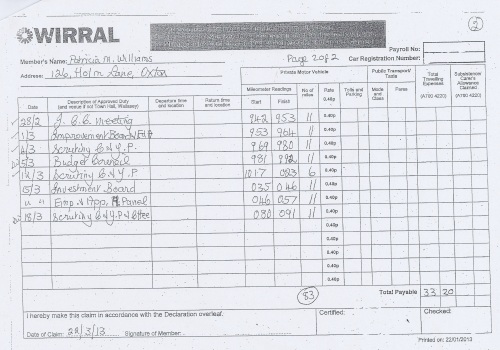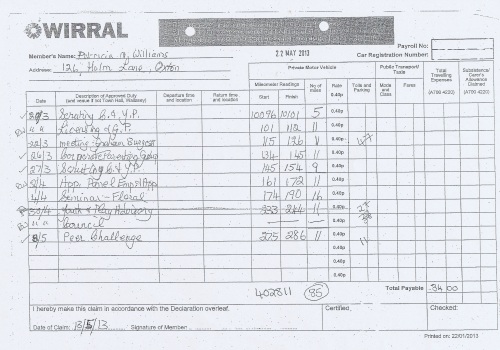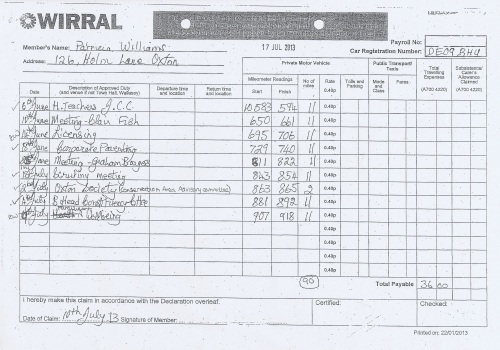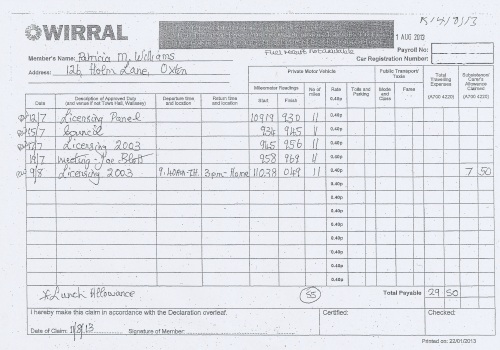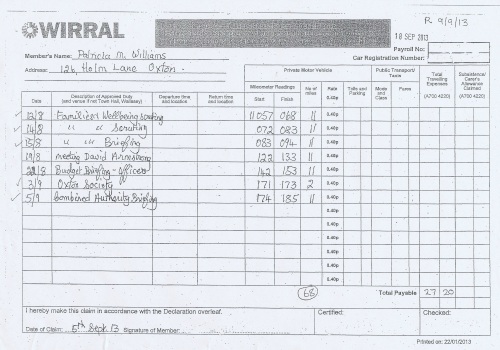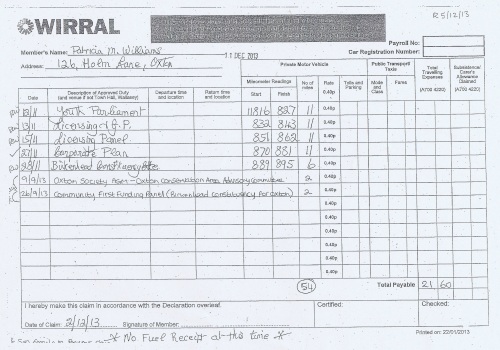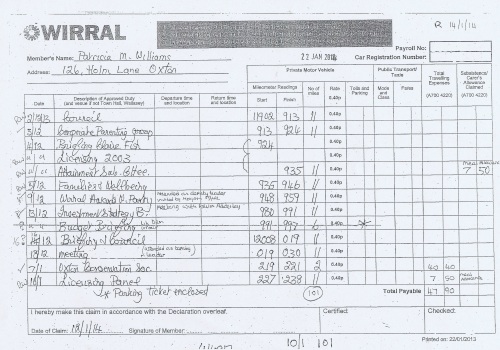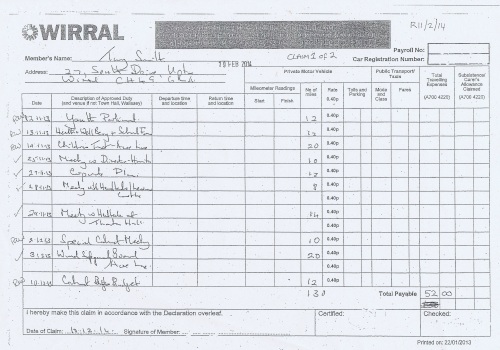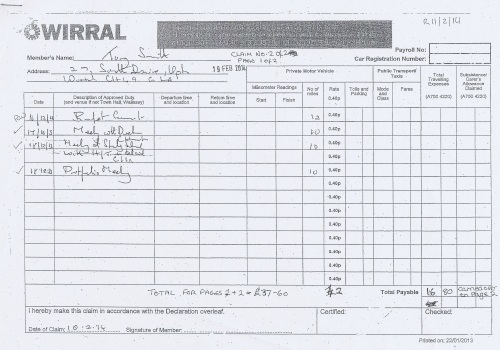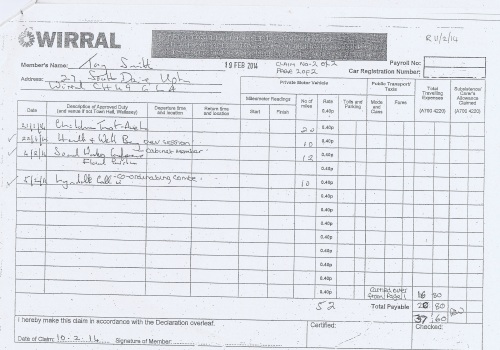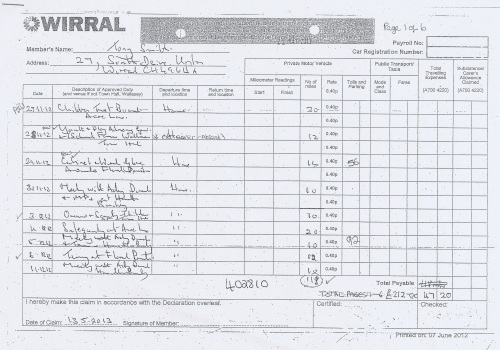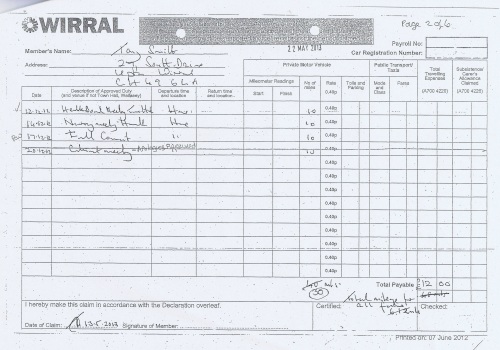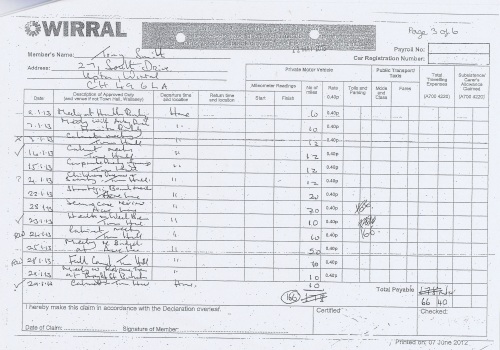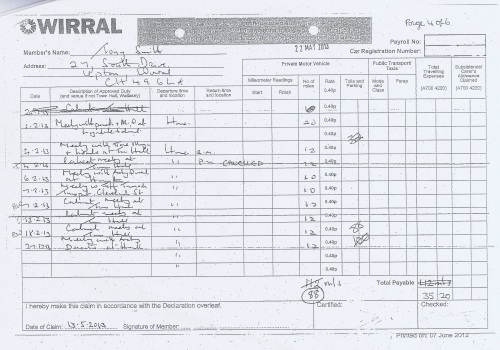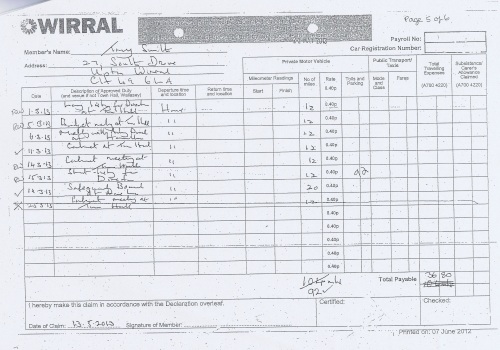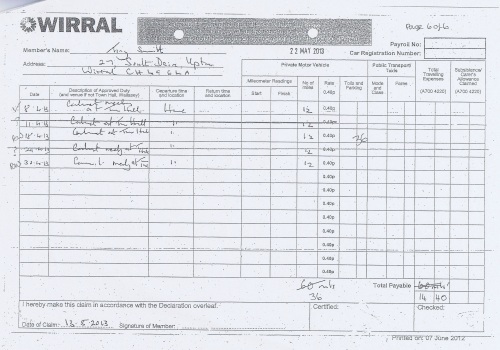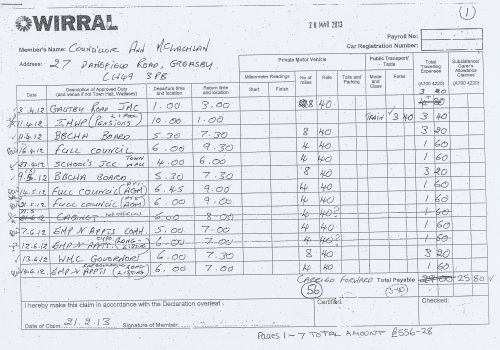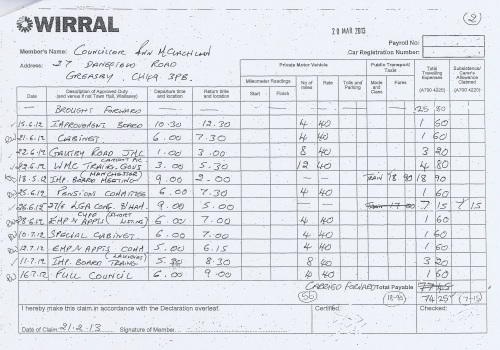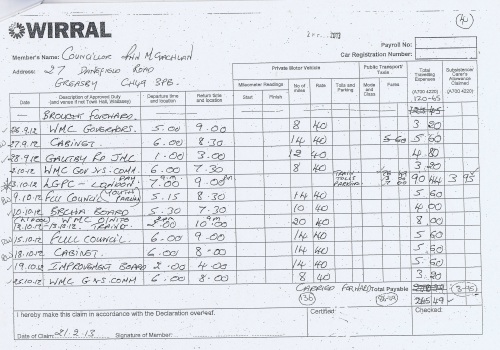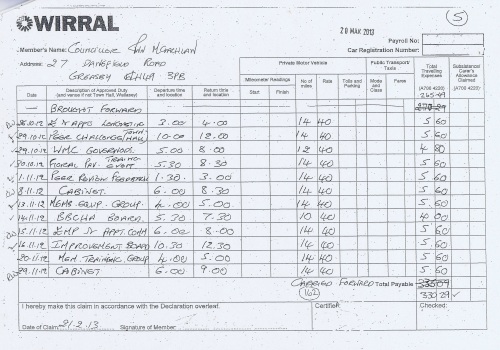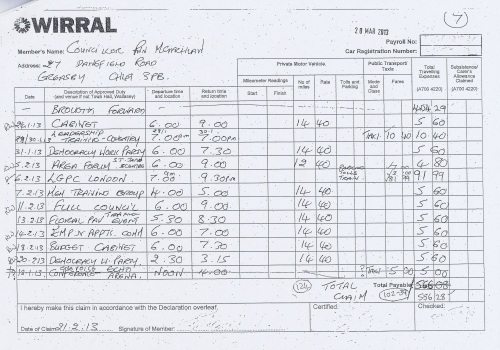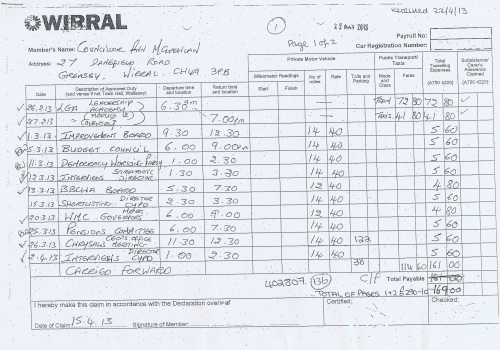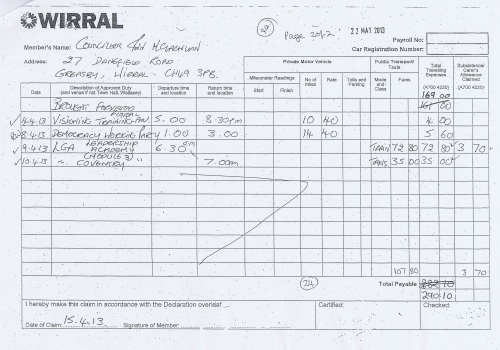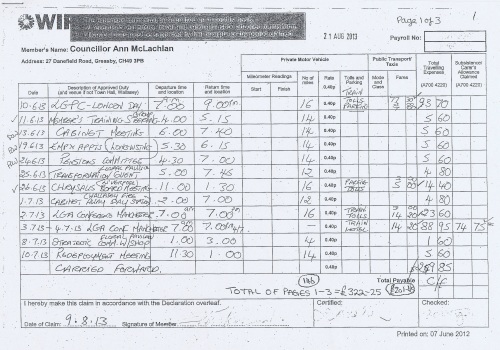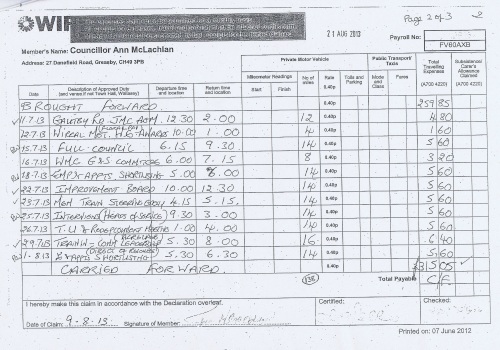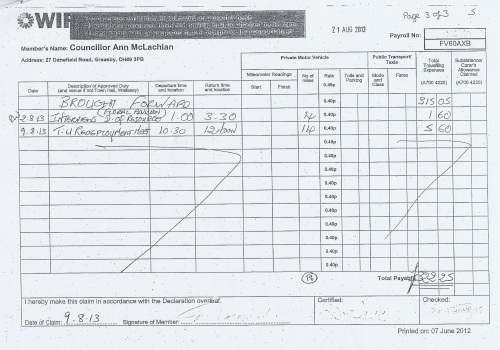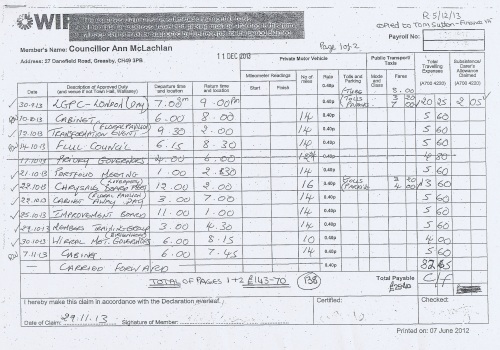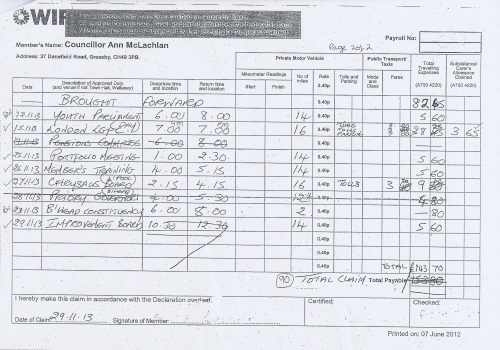What did Wirral Council’s response to my letter about the Lyndale School Cabinet decision on 4th September say?
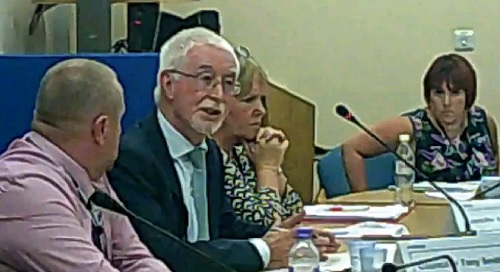
I have received a full response to my letter of the 8th September 2014 to Wirral Council about the Cabinet decision on the 4th September 2014 about the decisions on Lyndale School. This letter was received after the 24th September 2014 deadline in the letter of the 8th September 2014, although an earlier letter was also received stating that this letter would happen by the 1st October 2014. I have yet to consider my response to Wirral Council’s letter of the 30th September 2014 which is below.
The letter of 30th September 2014 is included below as is, there are some missing full stops and unnecessary apostrophes which have been printed as they were in the original letter.
For information I include it below. I am considering my options as to what to do next. The protocol states that an “application for judicial review must be filed promptly and in any event not later than 3 months after the grounds to make the claim first arose”.
That’s 3 months from 4th September 2014 so a maximum time limit of 4th December 2014. However it would be inadvisable to wait that long as permission would be denied for not being done “promptly”!
Personally I feel that we’re getting soon to the date when “promptly” would be an issue (although maybe that explains Wirral Council’s tactics). The call in has put implementation of the decision on hold until at least the 2nd October 2014.
For the ease of converting to HTML some minor formatting has been lost as to how it was laid out in order to get this published promptly. A line of equals signs represents the end of an A4 page.
(Wirral Council logo)
Department of Transformation & Resources
Joe Blott
Strategic Director of Transformation &
Resources
Town Hall, Brighton Street
Wallasey, Wirral
Merseyside, CH44 8ED
DX 708630 Seacombe
Website: www.wirral.gov.uk
date 30 September 2014
By Email and Post
to Mr John Brace
Jenmaleo
134 Boundary Road
Bidston
Wirral
CH43 7PH
your ref
my ref
service Legal and Member Services
tel 0151 691 8569 Please ask for Surjit Tour
fax 0151 691 8482
email surjittour@wirral.gov.uk
Response to Pre-Action Protocol letter
Dear Mr Brace
I write further to your letter before claim dated 8 September 2014. For the avoidance of doubt, this letter constitutes Wirral Metropolitan Borough Council’s (“the Council”) formal response in accordance with the Pre-Action Protocol for Judicial Review.
1. The Claimant
The proposed Claimant is Mr Brace; who is unrepresented.
2. The Proposed Defendant
The proposed Defendant is Wirral Metropolitan Borough Council.
3. Reference details
Wirral Metropolitan Borough Council: Surjit Tour, Department of Transformation and Resources, Town Hall, Brighton Street, Wallasey, Wirral, CH44 8ED
Mr John Brace: Jenmaleo, 134 Boundary Road, Bidston, Wirral, CH43 7PH
4. The details of the decision being challenged
The Council’s in-principle decision of 4 September 2014 to publish statutory notices in respect of the closure of Lyndale School (“Lyndale”) from January 2016.
5. Response to the Proposed Claim
The Council denies Mr Brace’s claim for the reasons detailed below.
6. Details of interested parties
No interested parties identified.
www.wirral.gov.uk
===================================================================================================================
7. Address for further correspondence and service of court documents
Please address any further correspondence in this matter to Surjit Tour.
8. Background
8.1 Lyndale School is a special school providing specialist educational provision for primary aged pupils, the majority of whom have Profound and Multiple Learning Difficulties (“PMLD”). There are 21 pupils currently on the roll, nine of whom will be transitioning to secondary school by the end of the 2015/16 academic year. The declining number of students admitted to Lyndale over recent years has drawn into question The Lyndale’s financial viability for the future.
8.2 In 2013 the Department for Education (“DfE”) radically reformed the way in which funding for High Needs pupils is provided. Previously, funding was based significantly on the number of places available at a school rather than the number of pupils actually attending. The new system places a far greater emphasis on the number of pupils attending and their specific needs. Lyndale has set a balanced budget for 2014/15 for 40 places and 23 pupils. Applying the new intended future DfE funding arrangements, Lyndale may only be funded for 23 places, a reduction of £170,000. This shortfall would only increase as the number of pupils reduces. Funding this shortfall would not be possible without a significant reduction in funding for other schools in the area.
8.3 In addition, there are two other primary schools, namely Stanley and Elleray Park which are rated as providing good and outstanding education to students with complex learning difficulties, some of whom will have PMLD.
8.4 The Report presented to Cabinet details why the option to expand Elleray Park and Stanley Schools was the most viable option and therefore we do not propose to go into any further detail here.
8.5 The report to cabinet on the 4th September 2014 contains information on the background history of CLD/PMLD provision. The report also details the responses to the consultation and the independent consultant’s report. A link is provided for your information:
http://democracy.wirral.gov.uk/ieDecisionDetails.aspx?ID=2786
8.6 Cabinet Resolved that:
8.6.1 (1) Cabinet thanks all those who have participated in the consultation exercise, with particular regard to submissions from parents of children at The Lyndale School;
8.6.2 (2) Having reviewed the responses received during the consultation process, analysed the alternative options and applied the SEN Improvement Test, it is recommended that:
8.6.2.1 Statutory notices be published in respect of the closure of The Lyndale School from January 2016.
8.6.2.2 That Wirral Council, under the leadership of the Director of Children’s Services, work individually with
===================================================================================================================
children and families, towards effecting a smooth and supportive transition to an alternative place at one of the following schools:
(a) – Elleray Park Special School
(b) – Stanley Special School
(c) – Another appropriate school
8.6.3 In doing so, that the Director of Children’s Services, in acknowledgement of the close relationships that exist between staff and pupils at The Lyndale School, investigates if staff could be employed, where possible, at receiving schools, (subject to legal practice and the approval of governing bodies).
8.6.4 The Director of Children’s Services be authorised to take all necessary steps to publish the proposals and ensure the prescribed procedures are followed, including requesting permissions from the Secretary of State, in furtherance of the proposals.
8.6.5 A further report be brought on the outcome of the publication of the statutory notices.
8.6.6 The Director of Children’s Services to ensure that Education, Health and Care Plans for all pupils of The Lyndale School are completed by 31st October 2014.
8.7 I respond to each of your proposed grounds of challenge as below.
9. Cabinet meeting notice requirements
9.1 You state in your letter that the Council has not complied with Regulations 8-9 of the Local Authorities (Executive Arrangements)(Meetings and Access to Information)(England) Regulations 2012 set out below as the document specified in Regulation 9 was not published.
9.2 Regulation 8
9.2.1 (1) In these Regulations a “key decision” means an executive decision, which is likely–
9.2.2 (a) to result in the relevant local authority incurring expenditure which is, or the making of savings which are, significant having regard to the relevant local authority’s budget for the service or function to which to which the decision relates; or
9.2.3 (b) to be significant in terms of its effects on communities living or working in an area comprising two or more wards or electoral divisions in the area of the relevant local authority.
===================================================================================================================
9.2.4 (2) In determining the meaning of “significant” for the purposes of paragraph (1) the local authority must have regards to any guidance for the time issued by the Secretary of State in accordance with section 9Q of the 2000 Act (guidance).
9.3 Regulation 9
9.3.1 (1) Where a decision maker intends to make a key decision, that decision must not be made until a document has been published in accordance with paragraph (2), which states–
9.3.2 (a) that a key decision is to be made on behalf of the relevant local authority;
9.3.3 (b) the matter in respect of which the decision is to be made;
9.3.4 (c) where the decision maker is an individual, that individual’s name, and title if any and, where the decision maker is a decision-making body, its name and a list of its members;
9.3.5 (d) the date on which, or the period within which, the decision is to be made;
9.3.6 (e) a list of the documents submitted to the decision maker for consideration in relation to the matter in respect of which the key decision is to be made;
9.3.7 (f) the address from which, subject to any prohibition or restriction on their disclosure, copies of, or extracts from, any document listed is available;
9.3.8 (g) that other documents relevant to those matters may be submitted to the decision maker; and
9.3.9 (h) the procedure for requesting details of those documents (if any) as they become available.
9.3.10 (2) At least 28 clear days before a key decision is made, the document referred to in paragraph (1) must be available for inspection by the public–
9.3.11 (a) at the offices of the relevant local authority; and
9.3.12 (b) on the relevant local authority’s website, if it has one.
9.3.13 (3) Where, in relation to any matter–
9.3.14 (a) the public may be excluded under regulation 4(2) from the meeting at which the matter is to be discussed; or
9.3.15 (b) documents relating to the decision need not, because of regulation 20(3), be disclosed to the public,
9.3.15 the document referred to in paragraph (1) must contain particulars of the matter but may not contain any confidential, exempt information or particulars of the advice of a political adviser or assistant.
9.4 It is accepted that the “in-principle” decision is a “key decision” under Regulation 8 and therefore the Council must comply with Regulation 9.
===================================================================================================================
However the Council has fully complied with Regulation 9 by publishing the Forward Plan for the period of August 2014 to November 2014.
9.5 The Forward Pan specifically identifies the “Outcome of Lyndale School Consultation” as a key decision and therefore complies with Regulation 9(1)(a) and (b).
9.6 Further, in compliance with Regulation 9(c), page two of the Forward Plan lists the names of the Cabinet members who would be making the decision. It also identifies that the decision is expected to be taken in September 2014 in compliance with Regulation 9(d).
9.7 In relation to Regulation 9(e)-(g), therefore were no reports available at the time the Forward Plan was published, however they were made available in advance of the Cabinet meeting.
9.8 For these reasons, the Council considers your point here to be without foundation.
10. Cabinet decision take by the wrong people
10.1 Your letter states that regulations require a member from the Church of England and Roman Catholic diocese to be appointed to the Council’s Families and Wellbeing Policy Committee and Coordinating Committee (“the Committees”). These committees review, amongst other things, the Cabinet’s decisions on education matters. As such they are “education overview and scrutiny committees” as defined in Regulation 13(1) Local Authorities (Committee System)(England)(Regulations) 2012 and must therefore comply with the requirements in the Regulations.
10.2 Specifically, Regulation 13(2) states that the “committees must have at least one qualifying person” which is defined in Regulation 13(3) as “the person nominated by the Diocesan Board of Education for any Church of England diocese.” Regulation 13(4) and (5) has the same provision in relation to Roman Catholic diocese. This is accepted by the Council.
10.3 However, you further state that as a Church of England diocese member was not appointed to the Committees, a member should have been appointed to the Cabinet. This is not required by any of the Regulations quoted in your letter, nor any other statutory provisions.
10.4 You claim that a Church of England diocese member was neither appointed to the Committees nor the Cabinet when the “in-principle” decision was made on 4 September 2014 that such decision is in someway invalid or defective. We set out below why the Council considers this is completely unfounded.
10.5 Firstly, Table 1, Point 18 of the Council’s Constitution states that the Executive has the authority “to consider and determine statutory proposals relating to the establishment and discontinuance of schools.” As you are no doubt aware, the Executive is comprised of the Leader of the Council and the Cabinet. Secondly, as referred to above, Diocese members are only required to be appointed to the Committees whose function is to review decision relating to decision. Furthermore, the role of the Committees is to scrutinise decisions of the Cabinet and, if necessary, recommend that Cabinet reconsider the decision. The Committees have no authority to nullify the decision of the Cabinet.
===================================================================================================================
10.6 The Cabinet was not required by any regulation or statutory provision to appoint a diocese member and had absolute authority to take the decision in this matter. Any claim to the contrary in entirely without foundation.
10.7 However, as stated, the Council is aware that it is required to have a Church of England diocese member on the Committees. To this end, we have contacted the diocese on numerous occasions in order to receive an appropriate nomination from them. As yet, a nomination has not been received despite the Council’s best efforts. This is due to no fault of the Council and as stated above, this anomaly does not invalidate the decision taken by the Cabinet on 4 September 2014.
11. Human Rights
The Council is fully aware of its obligations under the Human Rights Act 1998 (“HRA”) and the European Convention on Human Rights (“ECHR”) and ensures that all decisions it makes are fully compliant with these.
The Council refutes any suggestion that there has been a breach of the human rights of any children by the decision under challenge, for the reasons set out below.
11.1 Protocol 1 (Article 2) – Right to education
11.1.1 The assertion that the Council is denying the children of Lyndale the right to an education is entirely without merit. Article 2 of Protocol of the ECHR does not provide a pupil of an educational institution with the right to receive an education or be taught at a specific institution. It merely provides that a pupil must have access to the education system. No child currently at Lyndale is being, or will be, denied access to an education.
11.1.2 In addition, case law has established that local authorities have the discretion to allocate resources how they deem fit when arranging education provision, provided that a pupil is not denied access to the education system, which has not happened in this case.
11.1.3 No final decision has been made in relation to whether to close Lyndale or not. No child will be denied the right to continue their education and so will not be denied access to the system Therefore, there is no legal basis for this alleged ground of challenge.
11.2 Article 2 – right to life
11.2.1 To establish that this Article is engaged, you would have to demonstrate that either; a) the Council were deliberately trying to end the lives of the pupils; or b) we ought to be aware that there was a real and immediate risk to the lives of the pupils were they to be moved to alternative educational provision.
11.2.2 No decision has yet been made in relation to any specific pupil transferring to an alternative educational provider. Therefore this ground of challenge is entirely baseless.
11.2.3 Any suggestion that the Council are deliberately trying to end the lives of the children is simply untenable and there is no evidence to suggest that there is a real and immediate risk to their lives given that no decision has been made to transfer any child to an
===================================================================================================================
alternative educational provider. This ground of challenge is therefore completely unfounded.
11.3 Article 3 – prohibition of torture
11.3.1 The Council denies that the children of Lyndale would be subject to torture, inhumane or degrading treatment.
11.3.2 Torture is defined as “deliberate inhumane treatment causing very serious and cruel suffering.” It is refuted that the children of Lyndale would be subjected to any suffering, let alone serious or cruel suffering or otherwise.
11.3.3 Inhumane treatment is defined as treatment “causing intense physical and mental suffering.” There is no evidence to suggest that any children will be subjected to physical or mental suffering.
11.3.4 Degrading treatment is “treatment or punishment” which “humiliates and debases” the victim. The Council’s in-principle decision to publish a statutory closure notice cannot in any way be described as a decision designed to humiliate or debase the children of Lyndale.
11.3.5 You have provided no evidence to substantiate this claim and is it entirely without merit.
11.4 Article 11 – freedom of assembly
11.4.1 Your reference to this Article is unclear and the Council considers that the Article is not engaged in this matter in any event.
11.5 Article 14 – prohibition of discrimination
11.5.1 This Article is only engaged if a breach of another Article is proven. Given the difficulties, set out above, that you would have to sustain an argument that any of the above Articles have been breached, the Council denies that Article 14 is relevant.
11.5.2 You suggest in your Letter before Claim that the political views of the parents were discounted and that this, in some way, led to Article 14 being engaged. This is denied given the points raised above however we wish to point out that the views expressed by the parents during the consultation process were taken into account in this matter as demonstrated by the summary of the responses considered by Cabinet (which is publicly available online). The Council refutes the suggestion that differing political views affected the decision and denies that any individual or group has been discriminated in any way by its “in-principle” decision.
11.5.3 Further, your reference to children being born disabled is unclear.
12. Equality Act 2010 (“Equality Act”)
12.1 Section 13
12.1.1 You have provided no evidence to sustain an allegation that less money would be spent on the education of the Lyndale children if Lyndale were to close, therefore the Council considered this allegation unfounded.
===================================================================================================================
12.1.2 As mentioned in the Cabinet Report, the net result of a potential closure of Lyndale would be a £33,470 budget surplus. If the Council made a final decision to close Lyndale after completing all of the 5 stages of the statutory processes this could be shared across all remaining schools who would stand to gain £3,347 additional funding each.
12.1.3 The Council does not hold any information relating to the protected characteristics of any staff members of Lyndale. If you require this information we suggest you make further contact with the School direct.
This information is not held by the Council but the governing body of the school
12.2 Section 15
12.2.1 The aim of this process is to secure the highest standard of education possible for the children of Lyndale. In order to secure this, the Council has a duty to ensure that the provision of the education is affordable in the long-term. Your assertion that this is not a legitimate aim for the purpose of the Act is without foundation.
12.2.2 The Council has consulted extensively with interested parties, including staff, parents, Governors and the general public with regard to the potential closure of Lyndale and will continue to invite representations from such parties during the representation stage of the Statutory process. Having considered these views and the report which considered the SEN Improvement Test which was applied to a range of different options it has been decided, in principle, that the closure of Lyndale is the most proportionate means of achieving the legitimate aim set out in the 4th September cabinet report.
12.3 Section 19
12.3.1 This argument is legally flawed as, pursuant to s.19(1) Equality Act, the parents would have to possess a relevant protected characteristic. You have provided no evidence of this.
12.4 Section 26
12.4.1 The allegation that the Council has in any way violated the dignity of the persons affected by its decision, whether the children or otherwise, is entirely misconceived and without foundation and is not supported by any evidence.
12.4.2 Further, there is no evidence that any current or previous members of staff at the school have been intimidated by any members of the Council.
12.5 Section 27
12.5.1 For this section to be engaged, the Council would have had to have subjected the parents to a detriment directly because they have threatened legal proceedings. As far as the Council is aware, no legal proceedings have been issued.
===================================================================================================================
12.5.2 You have provided no evidence of this and therefore your claim is unfounded. In any event, the Council denies that any parents have been subject to a detriment.
12.6 Sections 85 and 86
12.6.1 Your claim in relation to these sections are also without foundation as you have provided no evidence to suggest that any children will be subject to a detriment as a result of this decision.
12.6.2 Furthermore, the Council has consulted a wide range of interested parties on a number of different options to ensure that all consultees were aware of the different proposals that the Council wished to consider prior to making an appropriate “in-principle” decision that would lead to the children continue to receive the highest standard of education.
12.6.3 In addition, the decision to commence the statutory process to publish a closure notice to close the school from 2016 is not determinative that the school will be closed or that the children will be moved to another school which is specifically designed to provide education to pupils with special educational needs and other disabilities. On that basis, the children will suffer no detriment as a result.
12.6.4 Further, the allegation that children are being penalised for their parents’ opposition to the proposals, or for any other reason, is entirely without foundation. This is simply incorrect and there is no evidence to support such a spurious allegation.
12.7 Section 112
12.7.1 The Council strenuously denies any breach of the Equality Act, therefore your point in relation to this section has no legal foundation.
12.8 Section 149
12.8.1 For the reasons set out at paragraph 14 below, the Council has clearly discharged its public sector equality duty under the provision of the Act.
12.9 Section 158
12.9.1 The Council accepts that the pupils at Lyndale have educational needs that are different from the needs of pupils in mainstream education. However, you state in your letter that pupils with Profound and Multiple Learning Difficulties (“PMLD”) form a small minority of the school population. This is not the case, there are 21 pupils on the roll at Lyndale, 18 of which are diagnosed as having PMLD.
12.9.2 In dealing with your point, we reiterate that the level of education provided to the children will not be affected by the proposals.
===================================================================================================================
13. Disability Discrimination Act 1995 (“DDA 1995”) and the Disability Discrimination Act 2005
13.1 I do not propose to respond in detail to the provisions referred to in the above Acts given that both were repealed by Schedule 27(1) Paragraph 1 of the Equality Act.
13.2 As a gesture of goodwill, I have listed below the points you have raised in relation to these Acts that are covered by the new Equality Act.
13.2.1 Sections 21B, 28B, 28C and 28F DDA 1995 are now covered by s.13 Equality Act.
13.2.2 Sections 21D and 49A DDA 1995 are now covered by s.149 EA 2010.
13.3 I have responded to the points raised under the new provisions above.
14. Equality Impact Assessment (“EIA”)
14.1 As mentioned above, the Council is fully aware of its public sector equality duty to have due regard to the need to eliminate unlawful discrimination, advance equality of opportunity and foster good relations between persons with a protected characteristic and those without.
14.2 In order to comply with this, the Council commissioned an EIAs which commenced on the 6th December 2013 and further reviewed on the 6th August 2014. The purpose of the EIA was to ensure that the Cabinet was fully aware of any equality implications when considering a proposal that Lyndale may close before making an in principle decision to public a statutory closure notice.
14.3 The EIA, which is publicly available online, assesses the impact that the proposals could have on pupils; staff at both Lyndale and other schools; and the parents of children affected by the decision. The EIA refers to the potential positive impact that the proposals could have on the children concerned, for example they may be provided access to new and varied opportunities, and steps that can be taken to ensure there are no negative consequences.
14.4 The members of the Cabinet had access to the EIA documents and reviewed both of them prior to making its decision of 4 September 2014. As such, it is clear that the council has had “due regard” to its’ public sector equality duty under the Equality Act.
15. SEN Improvement test
15.1 The Council is fully aware of its obligation to apply the SEN Improvement test to the decision in this matter. To assist compliance with this duty, the Council instructed an independent consultant to assess all the options.
15.2 Specifically in relation to the points you raise, Table 1 and Part 7.7 of the independent consultant’s report referring to the SEN Improvement Test (which is also publicly available) indicate that both alternative schools, Stanley and Elleray Park have at least as good Ofsted judgements. This demonstrates that if in due course it is proposed that Lyndale pupils are placed in either of these schools it will not limit their access but will improve their access to high quality education and services.
===================================================================================================================
15.3 The two alternative schools are special schools with staff that are suitably qualified to teach and support children although no decision has yet been made that a particular child will move to either of these alternative schools. Furthermore, if in due course the Council decides to implement a decision to close Lyndale it will look to support staff at The Lyndale in finding alternative employment. However, no decisions in this regard have been made, so this particular ground of challenge is extremely premature. However, the Council wishes to point out that no pupil’s access to specialist staff will be affected.
15.4 Part 7.7 of the Report also states that the first alternative school, Stanley, has new accommodation specifically designed to cater for children with PMLD. In particular, it has 12 large classrooms, a hydrotherapy pool and sensory facilities. The second alternative school, Elleray Park, is currently being expanded to enhance the specialist facilities that pupils with PMLD require. As such, it is clear that if a decision to close Lyndale is made in due course, pupils at Lyndale will be able to access suitable accommodation facilities at other schools in the area. This may include Elleray Park or Stanley Schools whose capacity has recently been increased.
15.5 On that basis your assertion that there will not be an improved supply of places is unfounded.
15.6 Further, reiterating what has already been mentioned in this letter, both Elleray Park and Stanley schools are special schools and are therefore more than able to receive pupils with PMLD and other complex needs.
15.7 Referring to the point you raise regarding funding, the Report clearly states that this is a viable option. Most other options lead to a budget deficit of between £26,000 and £168,000 which is financially unsustainable and would lead to a significant reduction in the quality of education provided to the pupils at Lyndale, which you will agree, is not a viable option. This proposal indicates there would be a surplus of £33,000.
16. Premature Challenge
16.1 In addition to all of the reasons stated above, the Council regards your threat of Judicial Review as being extremely premature. As is clearly stated in the Cabinet minutes, this is merely an “in-principle” decision to proceed with the statutory process.
16.2 There are still several stages of the statutory process to undergo which includes a stage whereby any person or organisation will be invited to make further representations to the Council in response to the statutory notices. The Cabinet is under a statutory obligation to consider such representations before making a final decision. It is possible, that the Council may decide not to close Lyndale School.
16.3 As these processes have not yet been completed and no final decision on the matter has been made, it is the Council’s view that any suggestion of a way of challenge by way of Judicial Review at this stage is extremely premature and unnecessary.
17. Further information
17.1 At section nine of your letter you outline numerous requests for further information. The Council’s response to each request is detailed below.
17.1.1 The Council’s Cabinet Report of 4th September 2014, its appendices and the record of the Cabinet decision of 4 September
===================================================================================================================
2014 sets out fully the Council’s reasons for its “in-principle” decision.
17.1.2 The Council does not hold statistical information relating to staff at Lyndale. It is possible that Lyndale may hold such information and it would therefore be appropriate for you to deal with Lyndale direct in relation to this request
17.1.3 You have requested information relating to statistics on any protected characteristics of the Council’s workforce. The Council does hold such information, but cannot see the relevance of this request in light of the proposed grounds of challenge. Any such information is held purely based on information employees have provided about themselves to the Council as their employer and is not relevant to the in principle decision to publish a statutory closure notice.
17.1.4 In relation to your request for statistics on pupils at Lyndale – the Council can confirm that currently 21 pupils are listed on the admission the roll at Lyndale. 18 children have been diagnosed as having PMLD, three have complex learning difficulties, two are of Asian (Indian) origin and the remainder are White British.
17.1.5 The Council believes that the financial information that is publicly available as part of the Cabinet report fully discharges its duty of candour in relation to the request for a three year projection of Lyndale School’s budget.
17.1.6 Any earlier draft of the report detailing the outcome of the consultation are not relevant as officers continued to consider their report in the light of feedback and responses
18. Documents you request
18.1 At Section 10 of your letter you request a number of documents that you consider relevant. The Council’s response to each request is detailed below.
18.1.1 Please refer to Appendix 6 of the Cabinet report (which is publicly available) which contains a summary of the responses received during the consultation.
18.1.2 The Council’s response to your request for these documents is detailed at Paragraphs 17.1.5 and 17.1.6 above.
18.1.3 Six public meetings which formed part of the Council’s consultation process were held, to which all interested parties including staff and trade unions were invited to attend. Notes of these are published with the Cabinet report at Appendices 5-7.
18.1.4 As part of the Council’s consultation process it met with the Chair of governors of Lyndale and the whole governing body in separate meetings.
18.1.5 There was no report commissioned from a Principal Educational Psychologist.
18.1.6 Details of how the Council think the preferred option meets the SEN Improvement test – this is detailed extensively in the Cabinet Report, its’ appendices and Paragraph 15 above.
===================================================================================================================
19. Action you request
19.1 For the reasons set out at paragraphs 9 and 10, the original Cabinet decision of 4 September 2014 was entirely valid and therefore your request that the Council issue an undertaking to postpone proceeding with the statutory process is unreasonable and inappropriate.
19.2 Any further Cabinet meeting that takes places that considers any decision associated with the decision made on the 4 September 2014 will, of course, comply fully with the regulatory and constitutional requirements, which the Council is subject to.
19.3 The Council is committed to openness and transparency about its decision-making and from the nature of the information that is publicly available all interested parties are able to determine the full range of information the Council took into account, including the different options considered, before the decision of 4 September 2014 was made. The Council is satisfied that its decision making process to date has been transparent and open, and does not consider that a further meeting would be beneficial particularly in light of the fact that the early stages of the statutory process have not yet completed and no final decision with regard to the potential closure of Lyndale has been made.
If you are still minded to pursue a claim for Judicial Review, the Council will vigorously oppose any proceedings and seek to recover its costs of defending such proceedings. We consider the threat of such proceedings to be premature, wholly misconceived and entirely without merit for all the reasons set out above.
Yours sincerely,
(signature of Surjut Tour)
Surjit Tour
Head of Legal and Member Services
and Monitoring Officer
If you click on any of these buttons below, you’ll be doing me a favour by sharing this article with other people. Thanks:

